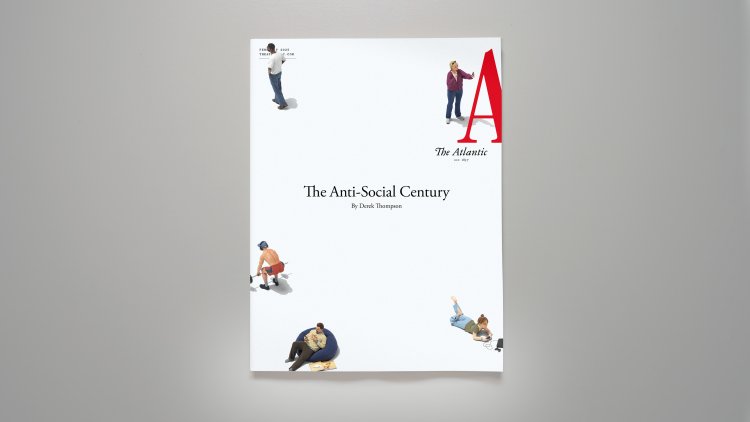<em>The Atlantic</em>’s February Cover Story: Derek Thompson on “The Anti-Social Century”
For The Atlantic’s February cover story, staff writer Derek Thompson explores “The Anti-Social Century”: why Americans are spending more time alone than ever, and how that’s changing our personalities, our politics, and even our relationship to reality. Thompson argues that self-imposed solitude might just be the most important social fact of 21st-century America, and that the nature of our social crisis is that most Americans don’t seem to be reacting to the biological cue to spend more time with other people. Thompson writes: “Day to day, hour to hour, we are choosing this way of life—its comforts, its ready entertainments. But convenience can be a curse … Over the past few months, I’ve spoken with psychologists, political scientists, sociologists, and technologists about America’s anti-social streak. Although the particulars of these conversations differed, a theme emerged: The individual preference for solitude, scaled up across society and exercised repeatedly over time, is rewi

For The Atlantic’s February cover story, staff writer Derek Thompson explores “The Anti-Social Century”: why Americans are spending more time alone than ever, and how that’s changing our personalities, our politics, and even our relationship to reality. Thompson argues that self-imposed solitude might just be the most important social fact of 21st-century America, and that the nature of our social crisis is that most Americans don’t seem to be reacting to the biological cue to spend more time with other people.
Thompson writes: “Day to day, hour to hour, we are choosing this way of life—its comforts, its ready entertainments. But convenience can be a curse … Over the past few months, I’ve spoken with psychologists, political scientists, sociologists, and technologists about America’s anti-social streak. Although the particulars of these conversations differed, a theme emerged: The individual preference for solitude, scaled up across society and exercised repeatedly over time, is rewiring America’s civic and psychic identity. And the consequences are far-reaching.”
If two of the 20th century’s most significant technologies, the automobile and the television, initiated the rise of American aloneness, the smartphone continued to fuel, and has indeed accelerated, our national anti-social streak, with screens occupying more than 30 percent of American kids’ and teenagers’ waking life. We’re also spending much more time at home, alone. In 2023, adults were spending an additional 99 minutes at home on any given day compared with 2003; a home developer told Thompson that “the cardinal rule of contemporary apartment design is that every room is built to accommodate maximal screen time.”
And “all of this time alone, at home, on the phone, is not just affecting us as individuals,” Thompson writes. “It’s making society weaker, meaner, and more delusional.” While home-based, phone-based culture has arguably solidified our closest and most distant connections––the inner ring of family and best friends (bound by blood and intimacy), and the outer ring of tribe (linked by shared affinities)––it’s wreaking havoc on the middle ring of “familiar but not intimate” relationships with the village of people who live around us but who may have different views from us. Thompson writes: “The village is our best arena for practicing productive disagreement and compromise—in other words, democracy. So it’s no surprise that the erosion of the village has coincided with the emergence of a grotesque style of politics, in which every election feels like an existential quest to vanquish an intramural enemy.”
Thompson concludes: “Although technology does not have values of its own, its adoption can create values, even in the absence of a coordinated effort. For decades, we’ve adopted whatever technologies removed friction or increased dopamine, embracing what makes life feel easy and good in the moment. But dopamine is a chemical, not a virtue. And what’s easy is not always what’s best for us. We should ask ourselves: What would it mean to select technology based on long-term health rather than instant gratification? And if technology is hurting our community, what can we do to heal it?”
Derek Thompson’s “The Anti-Social Century” was published today at TheAtlantic.com. Please reach out with any questions or requests to interview Thompson on his reporting.
Press Contacts:
Anna Bross and Paul Jackson | The Atlantic
[email protected]
What's Your Reaction?




















